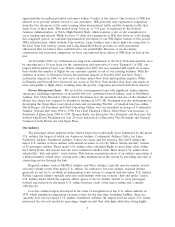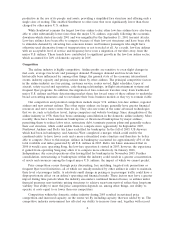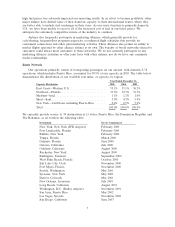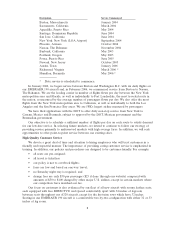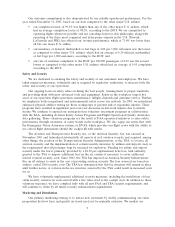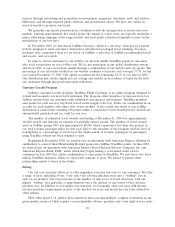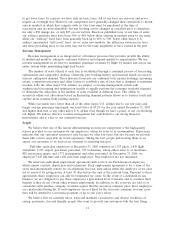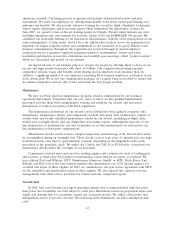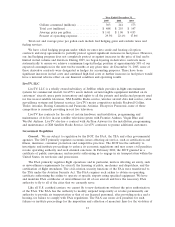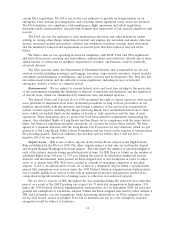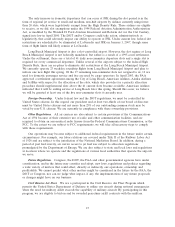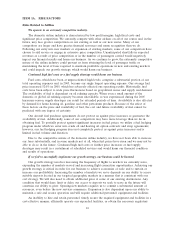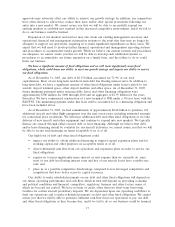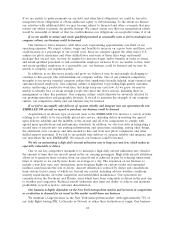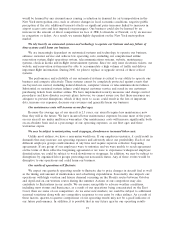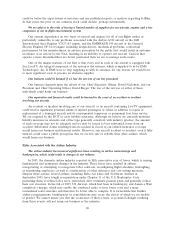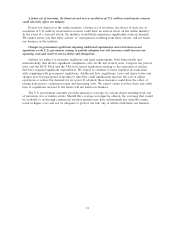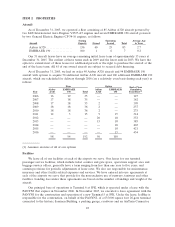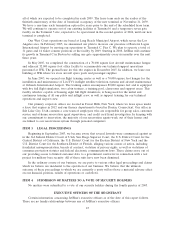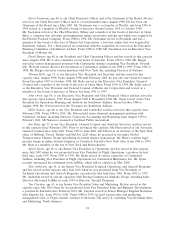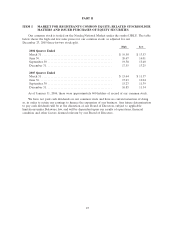JetBlue Airlines 2005 Annual Report Download - page 23
Download and view the complete annual report
Please find page 23 of the 2005 JetBlue Airlines annual report below. You can navigate through the pages in the report by either clicking on the pages listed below, or by using the keyword search tool below to find specific information within the annual report.The only increase in domestic departures that can occur at JFK during the slot period is in the
form of regional jet service to small and medium, non-hub airports by airlines currently using fewer
than 20 slots, which were legislatively exempt from the High Density Rule. These airlines are eligible
to receive, as we did, slot exemptions under the 1994 Federal Aviation Administration Authorization
Act, as modified by the Wendell H. Ford Aviation Investment and Reform Act for the 21st Century,
signed into law in April 2000. The DOT and/or Congress could take action, administratively or
legislatively, that could adversely impact our ability to operate at JFK. Under current law, federal slot
restrictions are scheduled to be eliminated at LaGuardia and JFK on January 1, 2007, though some
form of flight limits will likely remain at LaGuardia.
Long Beach Municipal Airport is also a slot-controlled airport. However, the slot regime at Long
Beach Municipal Airport is not federally mandated, but rather is a result of a 1995 court settlement.
Under the settlement, there are a total of 41 daily non-commuter departure slots and a single slot is
required for every commercial departure. Unlike several of the airports subject to the federal High
Density Rule, there are no plans to eliminate slot restrictions at the Long Beach Municipal Airport.
We currently operate 23 weekday roundtrip flights from Long Beach Municipal Airport and plan to
initiate one new flight this spring. Of the 17 remaining non-commuter slots not assigned to us, 12 are
used for domestic passenger service and five are used by cargo operators. In April 2003, the FAA
approved a settlement agreement among the City of Long Beach, American Airlines, Alaska Airlines
and JetBlue with respect to the allocation of the slots, which also provides for a priority allocation
procedure should supplemental slots above the 41 current slots become available. American Airlines
indicated that it will be ending service at Long Beach later this spring. Should this occur, we believe
we will be granted at least one of the five non-commuter slots it currently uses.
Foreign Ownership. Under federal law and the DOT regulations, we must be controlled by
United States citizens. In this regard, our president and at least two-thirds of our board of directors
must be United States citizens and not more than 25%of our outstanding common stock may be
voted by non-U.S. citizens. We are currently in compliance with these ownership provisions.
Other Regulations. All air carriers are also subject to certain provisions of the Communications
Act of 1934 because of their extensive use of radio and other communication facilities, and are
required to obtain an aeronautical radio license from the Federal Communications Commission, or the
FCC. To the extent we are subject to FCC requirements, we will take all necessary steps to comply
with those requirements.
Our operations may become subject to additional federal requirements in the future under certain
circumstances. For example, our labor relations are covered under Title II of the Railway Labor Act
of 1926 and are subject to the jurisdiction of the National Mediation Board. In addition, during a
period of past fuel scarcity, air carrier access to jet fuel was subject to allocation regulations
promulgated by the Department of Energy. We are also subject to state and local laws and regulations
at locations where we operate and the regulations of various local authorities that operate the airports
we serve.
Future Regulation. Congress, the DOT, the FAA and other governmental agencies have under
consideration, and in the future may consider and adopt, new laws, regulations and policies regarding
a wide variety of matters that could affect, directly or indirectly, our operations, ownership and
profitability. We cannot predict what other matters might be considered in the future by the FAA, the
DOT or Congress, nor can we judge what impact, if any, the implementation of any future proposals
or changes might have on our business.
Civil Reserve Air Fleet. We are a participant in the Civil Reserve Air Fleet Program which
permits the United States Department of Defense to utilize our aircraft during national emergencies
when the need for military airlift exceeds the capability of military aircraft. By participating in this
program, we are eligible to bid on and be awarded peacetime airlift contracts with the military.
15


